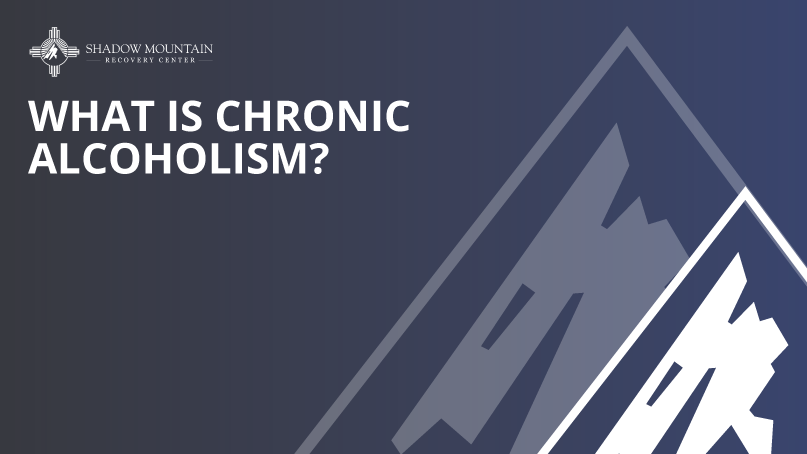What is Considered Chronic Alcoholism
Something that most people have observed in their lives is that not everyone who chooses to drink alcohol reacts to that alcohol in the same way. Similarly, people who choose to drink often drink different amounts of alcohol with differing frequency. Maybe your friend’s dad would drink a few beers in the evening after he finished some yard work, or maybe your cousin is a social drinker who sips wine at holidays and parties. Or you might even think of your best friend from college who used to party all weekend but now has a family and more often orders iced tea when you meet to reconnect. Most would not say that any of these people have a drinking problem, but when does alcohol use become a problem?
Chronic Alcoholism is when a person struggles to control their drinking. This person will have a problem with drinking alcohol even when their alcohol use becomes a problem that contributes to a declining quality of life. Someone experiencing chronic alcoholism will have to increase their alcohol consumption to get the desired feelings of intoxication, and will experience withdrawal symptoms when they decrease or stop their alcohol consumption.
Alcoholism is referred to as alcohol use disorder or AUD by healthcare professionals because this term better describes the conditions a person experiences as a result of excessive prolonged alcohol consumption. Alcohol use disorder has different stages. What many would refer to as chronic alcoholism would be considered a late stage of alcohol use disorder.
Risk Factors
A person does not develop alcohol use disorder overnight. It is usually a gradual process brought on by a number of factors in life. A few of these factors are:
- Steady drinking over time. Sometimes alcohol use disorder develops slowly as a person gradually increases the amount that they drink over a period of time.
- Starting at an early age. It is common that people who develop alcohol use disorder start drinking at an earlier age than those who use alcohol in a more casual way.
- Family history. Those who grew up in an environment where alcohol is used in an excessive way often mirror the alcohol use that they witnessed growing up.
- Mental health problems. It is common for those who experience mental health issues to seek out substances such as alcohol as a way to cope with these struggles.
- Trauma. As with mental health issues, someone dealing with trauma might seek out alcohol as a way to self medicate as they attempt to deal with their trauma.
- Social factors. Having a romantic partner or friends who drink a lot may influence the amount of alcohol a person consumes.
It should be noted that no one risk factor absolutely determines if a person will experience alcohol use disorder. Often many of the above risk factors are co occurring within the same individual. Also, many people who experience risk factors related to alcohol use disorder find other methods to cope with those factors.
Effects of Alcohol Use Disorder
Many individuals struggle with Alcohol Use Disorder in the United States. Alcohol related deaths in the U.S. reach around 95,000 a year, making it the third highest cause of preventable death. Here in New Mexico we see that in 2019 1,587 people died due to alcohol use.
While death is the most extreme result of AUD, other effects can negatively affect a person’s life. Individuals who are in the midst of alcohol use disorder will often experience things like:
- Relationship problems
- Poor performance at work or school
- Injury or accidents due to impaired motor skills
- Legal problems
- Increased high risk behavior
A person will possibly also experience health related issues such as:
- Liver disease
- Digestive problems
- Heart problems
- Diabetes complications
- Erectile dysfunction
- Menstruation issues
- Neurological complications
- Increased risk of cancer
Recovery From Alcohol Use
Recovery from alcohol use disorder is possible! Treatments exist that can aid a person as they stop using alcohol and fill their lives with more healthy habits. The first stage of recovery from alcohol use is detox. During medical detox a person’s body goes through difficult symptoms as their body learns to function normally without alcohol. We recommend that a person does this in a safe environment with trained staff to assist with the withdrawal process.
Some will then continue with a residential treatment program. During residential treatment a person in recovery will continue to receive support from professionals as they learn the skills they need to overcome their alcohol use disorder. One of the biggest advantages of a residential program is that alcohol is not available and patients are unable to drink during treatment.
Outpatient treatment is ideal for many people. In outpatient treatment a person recovers at home but comes to a facility for therapy, health services related to recovery, and other support. Outpatient is ideal for someone who can not pause their life to attend a residential program, but who also needs support in their recovery journey.
A number of treatment options exist to assist even the most late stage of alcohol use disorder that can be utilized during inpatient or outpatient treatment. The first is developing a treatment plan. This involves alcohol treatment specialists, and it will likely include things like goal setting, behavior change techniques, use of self-help manuals, counseling and follow-up care at a treatment center.
Often treatment involves group and individual therapy. In a therapeutic setting a person can receive valuable insight as they explore the reasons that led to their development of alcohol use disorder. Therapeutic care can lead to strategies that will assist a person as they seek to live an alcohol free life.
Sometimes a person uses medication as part of their recovery journey. Naltrexone is a drug that is orally ingested. It blocks the good feelings alcohol causes, and may prevent heavy drinking and reduce the urge to drink. Acamprosate is another oral medication. This medication may help you combat alcohol cravings once you stop drinking. Some medications are delivered to the body via injection. Vivitrol, which is a version of the drug naltrexone, is injected once a month by a healthcare professional. Many who have access to the injection have found that it is easier to manage than the pill form. However, vivitrol is prohibitively expensive and therefore can not be used by all who are seeking recovery from alcohol use disorder.
A vital part of the recovery journey is continued support. A person may still feel the urge to use alcohol after they finish an inpatient or outpatient program. Someone recovering from alcohol use disorder will need to be committed to the support of others as they continue their goal of living a healthy life.
Shadow Mountain Recovery Centers is excited to support you on your recovery journey! If you are ready to learn more about our alcohol recovery programs feel free to contact us or give us a call at 505-657-2117










